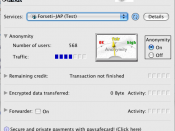Is Privacy In The 21st Century Possible?
Privacy was once valued and protected. But now with so many new and convenient technological advancements, is privacy in the 21st century possible? To protect our privacy Congress created the Electronics Privacy Acts (ECPA) to protect us from government access to private information that is transmitted and stored on the Internet, such as emails, private photos, or corporate data.
Congress has not updated the ECPA on technology since it was created, in 1986. When the ECPA was created there was no "World Wide Web", social networking was something in the future, and nothing was stored in what we call the "cloud." With all the technological changes in today's society no one is protected. Privacy is defined as being free from the public eye. Yet we have so many people sharing personal information on social networking websites, and government agencies monitoring emails, and phone calls most of the time without our knowledge.
There is no privacy in the 21st century, it is just a nostalgic feeling, and it is no longer practiced.
Today's privacy laws aren't up to date with today's technology. Things are rarely sent through the mail, and emails and text messages have replaced written communication. Online messaging and social networking was something of a novelty when lawmakers created the ECPA (Frolik, 2013). A recent article from the Dayton Daily news written by Cornelius Frolik on June 2013 he mentioned, "The Government can easily access many personal communications and other private information without sufficient probable cause". Instead of acquiring a warrant that requires more standards and procedures. Government agencies instead obtain subpoena's to obtain people's emails, and telephone records (Frolik, 2013). Although, local authorities catch lots of dangerous criminals through information online like emails, photos, and social media sites like...


